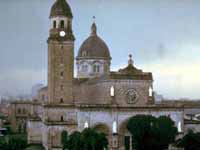 Manila OverviewManila, the somewhat daunting capital and pulsating hub of the
Philippines, is situated on the east coast of Luzon, the most
northerly island, the largest and the most developed. The city was
founded in 1571 on the site of a Muslim settlement. The city is
made up of 16 areas which were once towns in their own right, and
its major tourist attraction is the old Spanish walled city known
as Intramuros, which contains some historic buildings and
ruins. Modern Manila is a morass of traffic and people, polluted and
chaotic, an industrial metropolis that grew from the ashes of war
when in 1945, the United States' forces fought to recapture it from
Japanese occupation. It is also a city of theatres, libraries and
museums, and the home to the University of the Philippines. The
neighbourhoods of the metropolis vary from wide avenues full of
palatial homes to squatter camps where the poorest of the poor
scratch out a living. Visitors to the Philippines cannot avoid using Manila as a
starting point for their exploration of the other provinces and
islands, because most charter flights to the outlying islands leave
from the city's airport. The city is also within reach of day and
weekend getaways on the island of Luzon; this makes it a good base
for travellers intent on touring. One thing no visitor should miss
is a famous Manila Bay sunset: a light show created out of the high
humidity conditions coupled with the effects of cloud over the
city's harbour. This remarkable sight allows a short respite from
the more unpleasant aspects of the sprawling city. View the sunset
from Rizal Park, Roxas Boulevard or from a cruise boat that plies
around Manila Bay. |